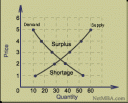A framework for normative economics
This is a post that Matt really should have written, but unfortunately he’s snowed under at work at the moment. Having said that, it’s not really much more than a plug for Steven Landsburg’s fascinating new paper entitled “The Methodology of Normative Economics”. Economists tend to shy away from making normative judgments: when constructing a social welfare function they claim to be maximising efficiency. Yet the form of that welfare function determines the form of the efficient solution. Moreover, people clearly have strong feelings about what constitutes an appropriate welfare function for a regulator to maximise.
Given that people feel strongly about what form this function takes it makes sense to model people as having preferences over different forms of the welfare function. For a welfare function to be ‘consistent’ it must predict that it is itself the optimal welfare function to use. Landsburg shows that, if rich people care about equity, there is only one such function that exists. Even if people are selfish and don’t care about equitable distribution of income, there are only a limited number of consistent welfare functions.
What I really like about Landsburg’s paper is that it forces economists to confront the normative judgments that they inevitably make when they talk about welfare. Yet it forces them to do so by using an analytical framework that they are comfortable with. Rather than forcing them to make value judgments, it allows them to talk about the normative framework of their model without having to resort to moral or philosophical discourse that they are ill-equipped to deal with.
Check out another of Landsburg’s methodology papers here if this stuff dings your bell.

